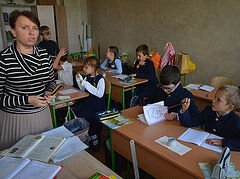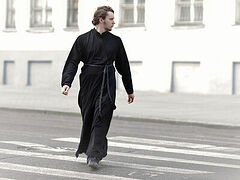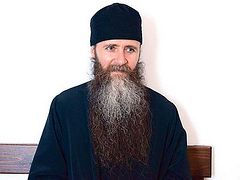 After the Divine Liturgy with the participation of the youth choir of the Annunciation Cathedral in Kaunas
After the Divine Liturgy with the participation of the youth choir of the Annunciation Cathedral in Kaunas
The Liturgy that I was able to attend on that October morning in the Orthodox Church of the Annunciation of the Most Holy Mother of God in Kaunas (Lithuania) brought a lot of faithful. It’s not that the church was packed, but there was just enough elbow room to stand there comfortably. The service was conducted in Church Slavonic, without any Lithuanian additions; at the same time, as a stranger, I was surprised by a few things: the addition of a prayer for the repose of the “newly deceased Queen Elizabeth” (a British monarch) and a supplication during the Litany for Metropolitan Onuphry, the Primate of the Ukrainian Orthodox Church, and Metropolitan Sabbas, the Primate of the Polish Orthodox Church. As I later learned, Metropolitan Onuphry was commemorated on the orders of the ruling hierarch, while Metropolitan Sabbas was remembered by the request of a deacon who studied in the theological institutions in Warsaw and personally knew the Primate of the Polish Church.
There are currently three priests and a deacon serving at the Annunciation Cathedral in Kaunas. The parish is made up mostly of people of Slavic descent and only a few Lithuanians, despite the general tolerance of Orthodoxy among the locals. Some of them, who adhere to the Roman Catholic faith, occasionally come to Orthodox services and pray before the “Surdeg” Icon of the Mother of God located in this church. Several people made the choice in favor of Orthodoxy—for some, it was due to family circumstances (if the other half was Orthodox), or every once in a while, as a result of agonizing choice and contemplation. It must be said, however, that there haven’t been any mass conversions to Orthodoxy in Kaunas and I don’t think there will be any in the future. Orthodoxy in Lithuania is to a great extent perceived as a foreign, or “Russian,” faith, and that’s why it’s hard for a simple Lithuanian to convert. Especially in our days, when the conflicts, instead of dying down, are sadly only heating up. So, the parish is mostly made up of cradle Orthodox, including the migrants—the church has seen a great influx of them over the past year, predominantly arriving from Ukraine.
The parish pays a lot of attention to its work with children and teenagers, because the issues of upbringing, education, and spiritual development of children have always been among the most difficult. It’s not always easy to convince a teenager to remain a member of the Church; it often happens that even those who grew up in religious families and attended services practically from birth leave the church. That’s why the children at the Annunciation Cathedral are offered explanations about the main principles of faith, good deeds, and keeping of the commandments that helps them in their spiritual growth. The church’s Sunday school has been operating for a long time and includes children of all ages—from the youngest (four to five year olds) to teenagers aged sixteen or seventeen. Galina Ivanovskaya is the Sunday school director; assisting her are Marina Soboleva (teacher) and Ludmila Sukhonitskaya (music teacher).
I was able to speak with the school’s director on the same day that I attended liturgy there.
“Normally, we start our school year in September (on the Ecclesiastical New Year) and we study the feasts,” Galina says. “But I see that the children get easily bored with all that, especially if they have already learned this material before as part of their Sunday school curriculum. Therefore, I often use YouTube videos on various modern social issues with our older students, so that we can discuss and internalize them later. This approach also works quite well, along with the more traditional route.”
Galina Ivanovskaya says she is constantly looking for new material from various sources and usually pulls everything together into a single study unit on the Saturday before classes. Each age group has its own topics. The approach and methods of teaching aren’t the same either, because the interests and abilities of a five-year-old and a fifteen-year-old differ greatly. Each lesson depends on the children’s mood (the Sunday school attendance is flexible, so the composition of classes fluctuates for various reasons).
“In practice, our youngest students are the easiest to work with,” Galina concedes. “Sure, they get tired easily, but we do a lot of coloring and drawing with them and they learn about many things through play. Let’s say a child saw a book with a cross on its cover: ‘But I found a book about our dearest Lord.’ She was talking about the Bible. So, we discuss that—for example, we had the theme, “We are Christians!”, so we talked about Christ and joy, how a believer will always find a reason to experience joy, and that we have to share it, especially with those who lack it. For this lesson, I used a animated film called, ‘Just Because!’ It is a great video where a happy boy presents a bouquet of flowers to a sad donkey—for no reason, ‘just because.’ And the joyful mood is transmitted to everyone else that receives this bouquet next. It is as if the world is undergoing transformation and, after being only black-and-white, it is now adorned in color. Good cartoons are our pillars of kindness. They help us to have more subtle conversations about the good, using certain storylines or examples.”
“But then your youngest students will move on to older classrooms, and many things change. Am I right?”
“Of course, the process of growing up continues. But even the older age groups will watch the cartoons because they are still interested in them. For example, there is a wonderful series of cartoons retelling stories from the Old and New Testaments, where we can relive the most significant moments in the relationship between men and their Creator… Overall, the children have free attendance at the Sunday school (they can come today and then will be absent for weeks at a time), and we also don’t have any strict requirements, either, like they do at general education schools. For example, when we studied Church Slavonic with our middle school group, I didn’t set a goal for all our children to learn it to the letter. What mattered most was that they would begin to understand the church services better. But generally speaking, being a teacher is a rather thankless job. When the children are young, they still maintain a certain level of acquisition of new knowledge, because they are excited about everything. Later on, as they reach adolescence, each one of them (to a different extent) gradually drifts away from spiritual life, because the surrounding world presents various other world views and values; their peers and everything related to their social life come to the fore, the intrinsic things are replaced by the superficial… They often leave the church for good. But you also understand that it wasn’t all in vain, when they return there as adults.
“In your opinion, what should parents do to prevent their children, who have been raised in the Christian faith since childhood, from leaving the Church as teens?”
“Unfortunately, many children (including those who were have been taken to church regularly), will leave the church when they grow up. The temptation of the surrounding world remains too great. I think that aside from talking to children and holding conversations and studying, it is important for them to see in their parents a personal example of how to live according to the faith. Because what we usually have is this: The parents brought their child to Sunday school, but they don’t even stay for the service; they leave, saying that they have other things to do. What kind of example will that be for their child? There are other cases, of course. Say, not long ago we had a fifteen-year-old boy who asked to assist in the altar, on his own initiative. His family is active in the church and his parents try to have a prayer life. When they drive somewhere, they usually turn on something spiritually uplifting, like short Bible commentaries… But even this boy, about three years ago, went through a difficult period in his life when he neither wanted to study nor to come to church.
“Perhaps the Lithuanian school system is a negative factor here as well? It should somehow conform to the standards of the European Union and we have hardly ever observed its good will towards Christianity.”
“I understand what you are trying to say. I have certainly been told about the sex education curriculum (which goes beyond the scope of Christian ethics) enforced by the European Union. Early on, the majority of parents were against it (Lithuania is traditionally a Catholic country), but the program was still implemented in the educational process. It has been subtly going on for many years already. Certainly, some teachers are trying to avoid talking about the most sensitive issues in their classes. But, on the whole, the local culture and mentality is such that the majority of people would rather conform to the existing rules or the program accepted as compulsory (even if only to avoid conflicts—just like anywhere else, people are dependent on life’s circumstances)…
But I, thank God, don’t work in a school setting (I would have found it very hard to submit to incompatible standards), and so I can only judge based on what I have been told. It would have been very difficult for me to work in a regular school environment, within the rigid framework of curricula and textbooks. Here, in our Sunday school, I try to select only what is among the most valuable and interesting things from a wealth of information available. In order to get our children’s attention, we should virtually act as “jesters”—it’s a general tendency that has to do with the hyperactivity of modern children, their mosaic thinking and their inability to remain focused for long periods of time. Sure, there is much public discussion about this. Up to a certain age, modern children will listen to you out of respect, but later they won’t. I can see that they are unable to remain focused. Apart from that, we also have students who question everything, including the teachings of the Church. They talk about homosexual “marriages” as if we (the adults) were incapable of understanding it, and that it means “love,” and that all of us here are so “intolerant of others.” Someone inculcated these ideas in their minds. We, as teachers, are obliged to listen to all this and keep hoping that it’s just a phase and that these children will grow out of it.
According to Galina Vyacheslavovna, when the children challenge the Christian teachings of faith, it is often is rooted in atheism and spiritual indifference of their parents. In any case, the faithful, the religious parents must keep an eye on the development of their children, take an interest in their lives, talk and gently reason with them. It is arduous work and hard labor that requires time, knowledge and effort. It is crucial that we don’t get too forceful here and give the child space. At the same time, we should teach him to reason, to contemplate, and to learn to make logical judgments—just as God has planned for us: to have both freedom and understanding.



